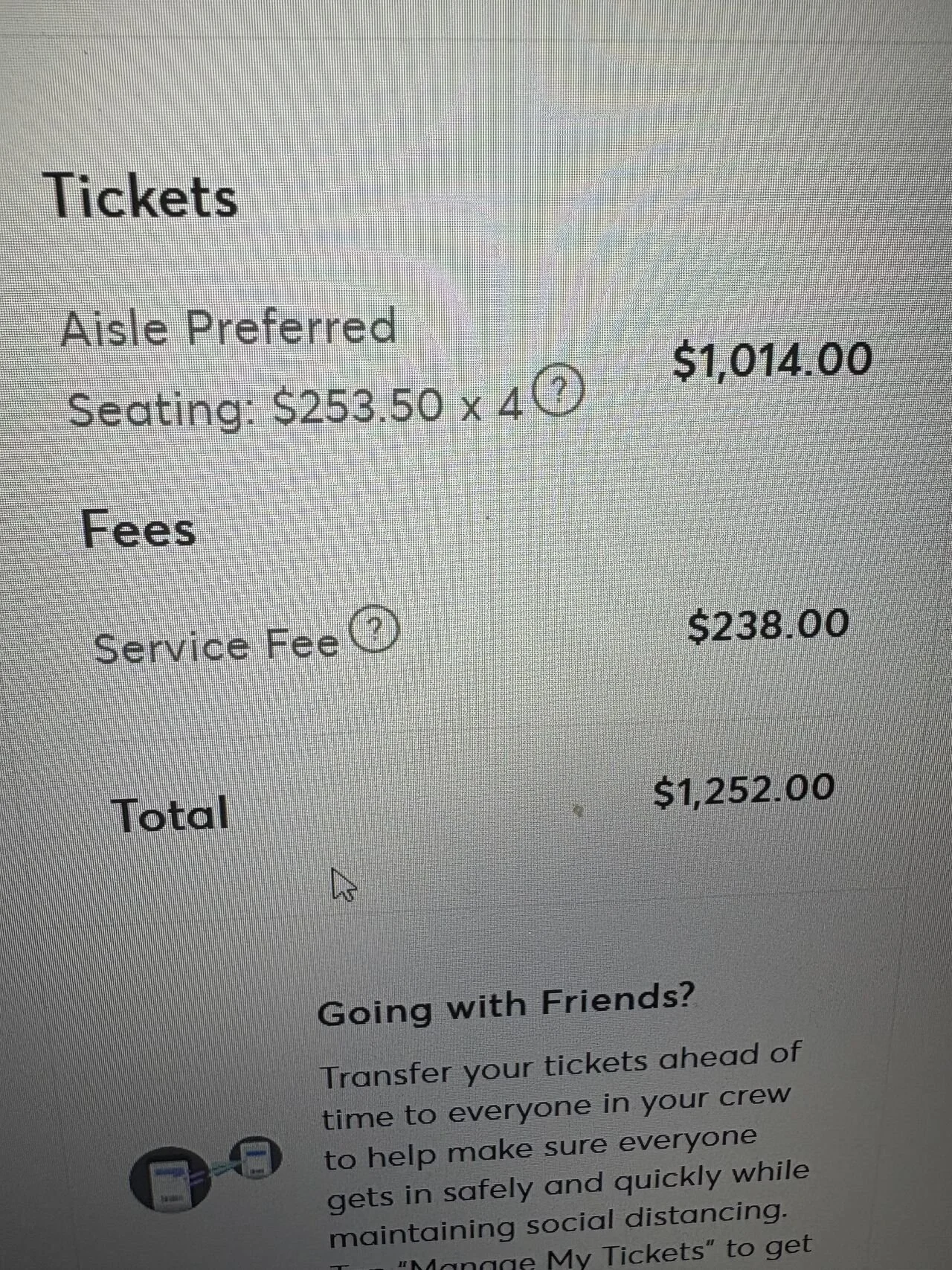The $238 Fee That Unmasked Music’s Corporate Machine
Four Paul McCartney tickets with my dad: $1,014
Ticket service fees: $238
Total: $1,252
Image description: 4 aisle seat tickets for Paul McCartney at Coors Field on October 11, 2025
My dad paid—because seeing live music together is our special tradition we’ve done almost every year together since 2003.
We saw Paul McCartney in Las Vegas in 2004. Humorously, my dutch boyfriend was there (we were 17 lol). My mom was there. My dad cried during "Hey Jude" — I think that was the first time I saw him do that. Now, two decades later, we’re going again. Probably for the last time cause I don’t know if you know how old The Beatles are.
I am beyond annoyed. I loathe this, like, a lot. Here I am on my punk rock pedestal saying “I’ve been saying this shit for 20 years but no one listens to me” whole spit. But, nah, I think it’s time I just crack this corrupt system wide open for all you curiously frustrated people.
And, I am done pretending this is just about a ticket. Ohhh baby, it’s not.
The crazy thing is I had this LinkedIn Post that popped. And, I’ve been on that oddly addicting platform for over 15 years and never have had a glimmer of a breakthrough post. But, when I mentioned my outrage with Live Nation because of HOW much they profit they receive and with what (their monopolies, data, ticketing, RFID wristbands, etc etc) it really struck a nerve.
So, let’s tear the roof off the music industry… shall we?
The System Behind the Fee
This isn’t about convenience. It’s about control. That service fee funds a sprawling corporate entertainment machine that:
Owns the artist
Owns the venue
Owns the festival
Owns the ticket
Owns the merch
Owns the data
And owns the algorithm that decides what you hear next
This is what I call the Cerulean Blue Effect in action: the illusion of choice, wrapped in a pleasant interface, concealing systemic control — and all rooted in the very real love fans have for the music. They’re not exploiting our apathy — they’re capitalizing on our passion.
Who Owns the Music Industry?
Each company’s ecosystem is self-sustaining, built to keep fans inside and artists on-brand. Here's how they operate:
🟢 Live Nation Entertainment
Owns: Ticketmaster, 400+ venues across 40+ countries, 100+ festivals, Front Line Management (over 250 artists), plus production, marketing, security, and concessions.
Stakeholders: Liberty Media (~30%), Vanguard, BlackRock, State Street.
Catalog Control: Holds stakes in licensing catalogs via artist management and publishing partnerships — influences what gets pushed in playlists and sync deals.
Fan Ecosystem:
Ticketmaster collects detailed buyer data, which feeds into Live Nation's ad tech for retargeting. Their mobile apps, loyalty programs, and RFID tech reinforce behavioral predictions, fueling dynamic ticket pricing, merch offers, and tour announcements tailored to your habits.Festivals: EDC, Lollapalooza, Bonnaroo, Governors Ball, BottleRock, Austin City Limits, Rolling Loud (partial deals).
Artist Deals: Madonna, Jay-Z, U2, Shakira, Blink-182, Logic, Red Hot Chili Peppers, Foo Fighters.
Rising Artists: Teddy Swims, Jessie Murph, KennyHoopla, Ice Spice, Peso Pluma, Chappell Roan.
🔵 AEG (Anschutz Entertainment Group)
Owns: 120+ venues globally, 30+ festivals, AXS ticketing, Goldenvoice, The O2 Arena, Crypto.com Arena, Dignity Health Sports Park, LA Live.
Stakeholders: Privately owned by Philip Anschutz; indirect ties through foundations and legacy investment structures.
Catalog Control: Goldenvoice promotes high-revenue legacy acts and newer signings; sync and brand tie-ins reinforce catalog monetization.
Fan Ecosystem:
AXS integrates with Clear biometrics and app ecosystems, leveraging facial recognition and location data to push VIP upgrades, early bird deals, and tiered experiences. AEG’s sports holdings allow for cross-promotional campaigns across fan demographics.Festivals: Coachella, Stagecoach, Firefly, All Points East, Hangout Fest.
Artist Focus: Taylor Swift, Beyoncé, Harry Styles, BLACKPINK, The Rolling Stones.
Rising Artists: Omar Apollo, Remi Wolf, Yves Tumor, Jean Dawson, Victoria Monét.
🟠 CTS Eventim
Owns: 200+ venues in Europe, 40+ major festivals, 60+ promoter and ticketing subsidiaries including See Tickets (UK/US), TicketOne (Italy), Ticketcorner (Switzerland).
Stakeholders: Klaus-Peter Schulenberg (~39%), BlackRock, Vanguard.
Catalog Control: Direct promoter-artist deals feed into broadcast licensing and sync rights through European broadcasters and digital platforms.
Fan Ecosystem:
Deep integration with See Tickets and Eventim analytics tools track purchase behavior across borders. Eventim-owned DSPs and ad networks help cross-sell experiences and monetize fan loyalty via tiered access, early access email programs, and behavioral coupons.Festivals: Rock am Ring, Hurricane, Southside, Love Supreme, Deichbrand, Airbeat One.
Artist Reach: Rammstein, David Garrett, Peter Maffay, Andrea Bocelli.
Rising Artists: Fred again.., Nia Archives, Paula Hartmann, LUNA, Schmyt.
🔴 Superstruct Entertainment
Owns: 85+ festivals, 15+ production companies, and venue partnerships worldwide.
Stakeholders: Providence Equity (founder), now KKR & CVC Capital.
Catalog Control: Partners with ID&T and Defqon.1 label projects; integrated with global electronic and techno publishing networks.
Fan Ecosystem:
Leverages loyalty wristband tech, brand activations, and international ticketing partnerships. Known for hyper-personalized email marketing and RFID-enhanced fan tracking at events, which is shared with brand sponsors for hyper-targeted post-festival engagement.Festivals: Sziget, Sonar, Boardmasters, Elrow, Wacken, Awakenings, Defqon.1, Mysteryland, Thunderdome (via ID&T).
Artist Focus: Carl Cox, Charlotte de Witte, Peggy Gou, Armin van Buuren, Tiësto.
Rising Artists: Héctor Oaks, LSDXOXO, VTSS, Anetha, SPFDJ, Chris Avantgarde.
How They Track and Control Fans
These companies don’t just promote shows — they profile your behavior and engineer your next experience. Here's how:
RFID Wristbands:
Used at most major festivals and venues to monitor where you go, how long you stay, what you buy, and who you interact with. This data is monetized through sponsor partnerships and targeted marketing.Dynamic Pricing:
Based on your browsing and buying history, ticket prices are adjusted in real time using AI — the more interest you show, the more you’ll pay.Behavioral Targeting:
Your activity on apps like Spotify, YouTube, and Instagram is cross-referenced with your ticketing history. Personalized ads are pushed to you when you're most likely to convert.Geo-fencing and Location Tracking:
Fans inside venues or festivals are digitally tagged for follow-up offers and artist-specific campaigns post-event.Data Partnerships:
Collaborations with platforms like Meta, Google, and Spotify let these companies track fans beyond the show — into your feed, your search history, and even your playlists.Fan Loyalty Algorithms:
Engagement scoring ranks how “valuable” you are as a consumer and serves you early access, exclusive merch drops, or VIP upgrades — all based on your data profile.
This isn't just about delivering great shows — it's about controlling the pipeline from discovery to transaction, all while building a predictive model of your musical life.
How the Ecosystem Feeds Itself
Each of these corporations has built a closed-loop entertainment empire where artists, venues, data, and content all feed into their own ecosystem — amplifying their power and market control.
Catalogs:
Stakeholders like Liberty Media, BlackRock, and KKR have a hand in both the ownership and distribution of massive music catalogs — from legacy icons to AI-trained up-and-comers. These catalogs aren’t just for listening; they’re mined for data, licensed for media, and used to train algorithms to predict what we’ll want next.Stakeholders:
Investment giants (Vanguard, CVC, State Street) profit from every ticket sold, stream played, ad viewed, and venue filled. The music becomes just one spoke in a financial flywheel turning toward quarterly gains.Fan Data:
All that biometric, behavioral, and purchase data? It feeds proprietary dashboards used to decide which artists get a push, which venues get bookings, and which fans are most profitable.Monetized Loyalty:
The more data you generate, the more you’re shaped into a 'fan type' — which triggers automated offers, early access invites, merch drops, and targeted content. This isn’t fandom. It’s segmentation.Platform Interlock:
These conglomerates collaborate with social media platforms, DSPs, merch vendors, and ad tech firms to circulate their artists, boost tours, and prioritize their properties algorithmically. Your Spotify suggestions and your YouTube ads are often just mirror reflections of what one of these giants is trying to sell you.
It’s not just a business. It’s a feedback loop of influence — a full-stack entertainment monopoly built on emotional connection, optimized by machine learning, and bankrolled by global investors.
Trapped In, Locked Out: The Artist Dilemma in the Corporate Music Machine
The music industry’s not just expensive for fans. It’s a trap for artists, too.
Whether you’re in the system or out of it — you’re losing.
If You’re In the System (Live Nation, AEG, Superstruct, etc):
You’re likely signed to a 360° deal. That means:
You don’t just give up streaming rights.
You give up cuts of touring, ticketing, merch, sync licensing, VIP, AND data.
You’re booked on festival circuits owned by your boss (Live Nation owns the festival, venue, ticketing system, and sometimes even your manager). You perform in a pre-engineered slot, surrounded by other “roster acts” to keep it all in-network.
You’re told it’s a career-maker. But here’s the truth:
You can’t negotiate set times
You can’t sell merch freely (many venues take a 15–25% cut)
You can’t bring your own openers
You’re forced to tour where it makes corporate sense — not where your fans actually live
You’re profitable. But you’re not free.
If You’re Outside the System:
Good luck.
Can’t book major venues — they’re owned by Live Nation or AEG
Can’t get prime festival slots — already spoken for by in-roster talent
Can’t run your own ticketing — you’ll be throttled by algorithms and platform limitations
Can’t get press — many outlets rely on relationships with the same corporate PR firms
Even worse?
Spotify and YouTube algorithms are trained to favor in-network artists
Discovery playlists are not neutral — they’re engineered funnels based on marketability, ad partnerships, and backend priorities
Touring independently costs more than it returns, especially with rising travel, hospitality, and insurance fees
So while corporate-backed dumb dubstep artists play random big shows for $75+ a ticket, other cooler artists — with real sound that isn’t a Bassnectar wannabe like we’re in 2013 — can’t even get booked cause it’s “just not the right vibe”.
The Result?
Mid-tier, algorithm-friendly acts flood the festival circuit
Real talent gets buried under marketing budgets
Ticket prices skyrocket, and fans get less while paying more
Fans settle for “just okay” live experiences because there’s no access to better ones
It’s a feedback loop:
Data → Drives funding → Drives festival slots → Drives ticket pushes → Feeds more data.
And if you’re not already inside? You’re outside the wall — unheard.
What Needs to Change?
Venue independence
Artist-first ticketing and merch splits
True platform transparency in discovery and streaming
Fan funding and direct artist support as a viable revenue model
Curated community events not controlled by Live Nation, AEG, or PE-backed collectives
My WORD IF IT MEANS ANYTHING
I’m not just calling this out — I’m tracking it. The only way past is through bitches — and we have to find a way to work together while holding big money and big data machines accountable.
Every backdoor deal. Every tour ad funnel. Every artist contract clause. Fans deserve affordable shows. Artists deserve more than exposure. And we all deserve to be treated better than whatever this data monster shit is.
This culture deserves clarity — and actual choice.
Maybe you heard it here first. Maybe you didn't. Does it matter?
—Stacy

